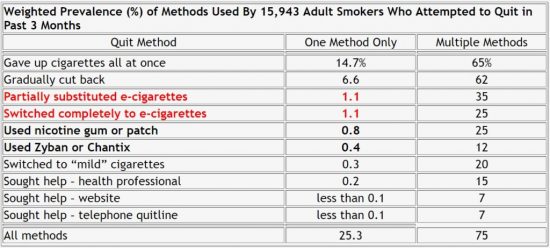CDC Report Shows That More Smokers Try to Quit with E-Cigarettes Than FDA-Approved Cessation Aids
U.S. health regulators continue to downplay the importance and effectiveness of electronic cigarettes as smoking cessation tools, but a recent report from the Center for Disease Control and Prevention (CDC) clearly shows that smokers believe that they have a much better chance of quitting with e-cigs than with FDA-approved aids like nicotine patches and gum.
Last Thursday, the CDC published a 26-month study of 15,943 adult cigarette smokers, in the journal Preventing Chronic Disease. The goal of this research was determining which were the most popular smoking cessation methods used by U.S. smoker between 2014 and 2016. Survey participants were adult smokers who reported at least one quit attempt in the last 3 months. Current cigarette smokers were defined as adults aged 18 years or older who had smoked at least 100 cigarettes in their lifetime and currently smoked “every day” or “some days.”
The survey was conducted in 6 waves, from April 7, 2014, through June 2, 2016, and provided a list of 10 quit methods, of which respondents had to choose one or multiple answers according to their smoking cessation habits. Results showed that 74.7% of adult current cigarette smokers used multiple quit methods during their most recent quit attempt, with giving up cigarettes all at once (65.3%) and gradually cutting back on cigarettes (62.0%) being the most popular answers.
But when it came to using a smoking cessation aid, electronic cigarettes turned out to be the most popular, with 35.3% of respondents saying that they substitute tobacco cigarettes with e-cigarettes, compared to just 25.4% who reported using FDA-approved nicotine patches and gum, and 12.2% who relied on cessation medications like Chantix or Zyban. 7.1% of respondents said they got help from a website and 5.1% used a telephone helpline.
“Before this study, we knew that some cigarette smokers were using e-cigarettes to attempt to quit, but we did not know how the rise in e-cigarette use, particularly among current adult cigarette smokers, may have affected quitting behaviors. We found that substituting some cigarettes with e-cigarettes was used by a greater percentage of smokers than the nicotine patch, nicotine gum, or other FDA-approved cessation aids,” the authors wrote.
“There is no conclusive scientific evidence that e-cigarettes are effective for long-term cessation of cigarette smoking. E-cigarettes are not approved by the FDA as a smoking cessation aid. FDA-approved medications have helped smokers to quit, in many instances doubling the likelihood of success . Finally, we found that most smokers who are switching to e-cigarettes or “mild” cigarettes are not switching completely. These smokers are not stopping their cigarette smoking.”
So, yeah, even though people are putting more faith in e-cigarettes than in FDA-approved aids – for good reason – the CDC is still trying to de-emphasize their role in smoking cessation, while praising FDA-approved tools that statistics show have very low success gates. So we’re basically idiots for using them, but luckily not everyone shares their opinion.
Brad Rodu, a professor of medicine at the University of Louisville and a supporter of electronic cigarettes as an alternative to smoking, said that “far fewer smokers use FDA-approved aids, which have been promoted by federal health authorities for many years.”
“Smokers know that, while safe, they are decidedly ineffective,” Rodu added. “This study documents that vaping is American smokers’ most popular quit-smoking aid, despite a broad misinformation campaign labeling e-cigarettes as neither safe nor effective.”
David Sweanor, an adjunct law professor at the University of Ottawa and the author of multiple e-cig studies said that the CDC report confirms that “an increasing number of smokers are using e-cigarettes in their efforts to quit smoking”. He also declared himself disappointed that that “ideology or financial conflicts may be blinding (the American Lung Association) to the enormous public health gains that can come from giving smokers additional viable options for saving their lives.”
“They need to be facilitating rather than impeding informed choices about those options,” Sweanor said.

















